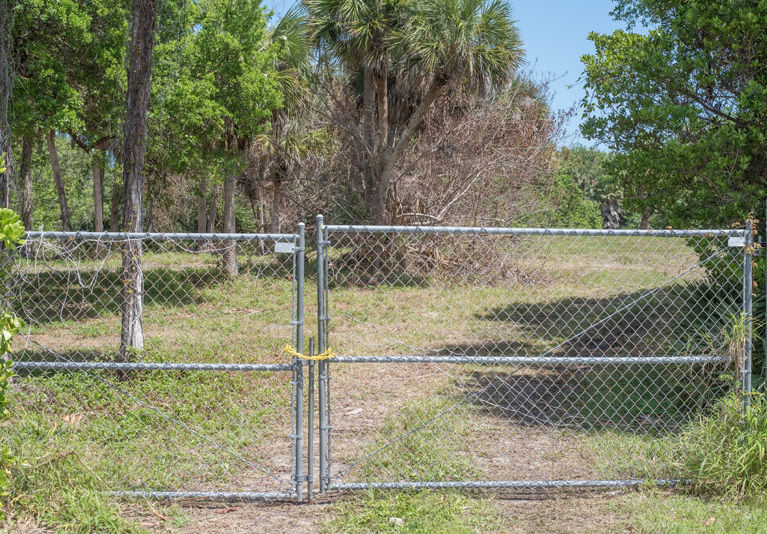
Indian River Shores appears to be pushing ahead with plans to market a stretch of Town-owned land on A1A for development, despite objections from neighbors. But residents who for decades have traipsed across the property to the beach likely will be able to retain that convenience.
The rezoning of the 5.5-acre parcel between Pebble Beach Villas and Surf Lane in Indian River Shores was approved unanimously by the Town Council, which ultimately hopes to sell the property appraised at $7.7 million for development, despite the wish of some residents that it be turned into a park.
At the time Pebble Bay and Pebble Beach Villas were being developed by the Schlitt family, Ed and Marguerite Schlitt sold the parcel to Indian River County for a fraction of market price, with the understanding that homeowners in the Schlitts’ newly developed communities would enjoy passage to and from the beach across the land.
The Town purchased the property from the County as part of a land-swap deal, but Town officials never changed the park land designation. Some previous town manager put up a fence with gates and signs declaring “Pedestrian Beach Access” during daylight hours.
Town Attorney Chester Clem told the Town Council last month that the signs and assumed right by residents west of A1A to cross the property posed a public danger and created a potential liability for the city. If someone crossing the highway was struck by a car, the Town might be sued for in some sense encouraging a dangerous activity.
Steve Schlitt, son of the couple who donated the land, said that after Clem’s opinion, the signage was swiftly removed, as was any reference to the beach access amenity on the Town’s website. Schlitt spoke out twice at meetings about the issue, urging the Town to honor the intentions of the deal struck with Indian River County officials so many years ago.
Property owners in Pebble Bay and Pebble Beach Villas who oppose the rezoning and development of the parcel retained long-time barrier island attorney Michael O’Haire to represent their interests and speak on their behalf at a series of town meetings. Sounding primed for an esoteric battle of wits with Clem about tort law, O’Haire said the Town’s expressed concerns about liability are fallacious.
“There have been a number of references to the use of the property being questioned, and that it presents a public safety and liability problem. I don’t think history has shown this to be the case,” O’Haire said, adding that the Town as a municipality is covered by the legal principle of “sovereign immunity,” which limits what a litigant can obtain in a liability judgment to no more than $100,000.
Not wanting the rezoning and potential development of the parcel to erupt into yet another threat of litigation, as occurred over the cell phone tower, Mayor Brian Barefoot said he wants to work with neighboring residents to address concerns about the potential loss of historically enjoyed beach access.
“There is no hurry, and no developer is waiting to proceed,” a Town memo last week stated, giving notice that the council plans to discuss an easement for beach access when it comes together again for its July 28 meeting.
The council’s proposal on the easement has yet to be seen, but Schlitt said Monday that he’s pleased with this step. “It’s huge progress and a big win for the people who live in Pebble Bay,” Schlitt said.
Part of the reason for the ill feelings about the rezoning is the conjecture that has swirled around about why Town had the land appraised earlier this year after decades of allowing it to lay fallow. Opponents of the sale speculated there must be a developer waiting in the wings to buy the land. The property is, after all, the only undeveloped chunk of oceanside property in the Shores.
Barrier island broker and developer Clark French’s name has come up more than once, and was mentioned, hypothetically, by Barefoot at a May Town Council meeting.
French, who deals in high-end real estate projects up and down the barrier island, was surprised to hear his name invoked. He said if a developer is driving the process, it’s not him.
Nothing in any event will happen at the site overnight.
Any offer to purchase the property would need to come back to the Town Council for approval, as would any site plan for single-family or multi-family residences on the parcel. Variances, if sought, would need to be approved, as would plans for parking and landscape buffers.



